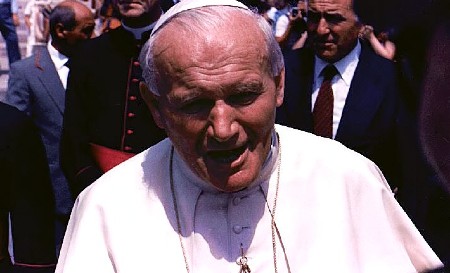 Hi readers, it seems you use Catholic Online a lot; that's great! It's a little awkward to ask, but we need your help. If you have already donated, we sincerely thank you. We're not salespeople, but we depend on donations averaging $14.76 and fewer than 1% of readers give. If you donate just $5.00, the price of your coffee, Catholic Online School could keep thriving. Thank you. Help Now >
Hi readers, it seems you use Catholic Online a lot; that's great! It's a little awkward to ask, but we need your help. If you have already donated, we sincerely thank you. We're not salespeople, but we depend on donations averaging $14.76 and fewer than 1% of readers give. If you donate just $5.00, the price of your coffee, Catholic Online School could keep thriving. Thank you. Help Now >
John Caryll
FREE Catholic Classes
Poet, dramatist, and diplomatist, b. at West Harting, England, 1625; d. 1711; not to be confounded with his nephew, John Caryll, immortalized by a line in Pope's "Rape of the Lock". He was head of an old English Catholic and royalist family at that time settled at West Harting, in Sussex. His father, of whom he was heir, was likewise named John; his mother was a daughter of William, second Baron Petre. Of his education he received part at the English college of Saint-Omer, in Artois, part at the English College in Rome. During the reign of Charles II he produced several plays and poems of more than average merit. In poetry his chief performances were a translation of Ovid's Epistle of Briseïs to Achilles, first appearing in 1680 in a work entitled "Ovid's Epistles, translated by several hands", and afterwards separately; also a translation of Vergil's first Eclogue, printed in Nichol's "Select Collection of Miscellany Poems" and published in 1683. His plays, both of them brought out at the Duke of York's Theatre, were a tragedy written in 1666 and called "The English Princess, or the death of Richard III" (Samuel Pepys, who saw this piece acted 7 March, 1667, found it no more than "pretty good"), and a comedy entitled "Sir Solomon Single, or the Cautious Coxcomb", which came out in 1671, upon the pattern of Moliere's "Ecole des Femmes". In 1679, during the national madness brought on by Titus Oates's pretended "Popish Plot", Caryll, as a Catholic of distinction, was committed to the Tower of London, whence he had the good luck soon to be let out on bail. When James II succeeded to the throne in 1685, he sent Caryll as his agent to the court of Pope Innocent XI, withdrawing him some months later upon the Earl of Castlemaine's appointment to that post. Caryll was then appointed secretary to Queen Mary of Modena, in whose service he continued after the Revolution of 1688, when he followed the exiled royal family across the sea to Saint-Germain. From his voluntary expatriation, however, there ensued no confiscation of his property until 1696, when, by reason of his implication in one of the plots to overthrow William III, he having furnished money for that purpose, his estate at West Harting was declared forfeited and himself attainted. His life interest in West Harting was thereon granted to Lord Cutts, but redeemed by Caryll's nephew aforesaid for £6,000. The dethroned King James II died in 1701, being succeeded in his rights and claims by his son, the so-called Pretender, who as King James III conferred upon Caryll the empty title of Baron Caryll of Dunford and the office of one of his secretaries of state. Meanwhile, in 1700, Caryll had published anonymously another work, this time in prose, entitled "The Psalmes of David, translated from the Vulgat". He died 4 September, 1711, and was buried at Paris in the church of the Scotch college, of which he had been a benefactor and where there was set up a tablet to his memory. He left no issue. His wife was Margaret, a daughter and co-heir of Sir Maurice Drummond. One of his sisters, Mary, became first abbess of the English Benedictine nuns at Dunkirk. The last of the Caryll family, a grandson of the above mentioned nephew, died in poverty at Dunkirk in 1788.
We ask you, humbly: don't scroll away.
Hi readers, it seems you use Catholic Online a lot; that's great! It's a little awkward to ask, but we need your help. If you have already donated, we sincerely thank you. We're not salespeople, but we depend on donations averaging $14.76 and fewer than 1% of readers give. If you donate just $5.00, the price of your coffee, Catholic Online School could keep thriving. Thank you.Help Now >
 Hi readers, it seems you use Catholic Online a lot; that's great! It's a little awkward to ask, but we need your help. If you have already donated, we sincerely thank you. We're not salespeople, but we depend on donations averaging $14.76 and fewer than 1% of readers give. If you donate just $5.00, the price of your coffee, Catholic Online School could keep thriving. Thank you. Help Now >
Hi readers, it seems you use Catholic Online a lot; that's great! It's a little awkward to ask, but we need your help. If you have already donated, we sincerely thank you. We're not salespeople, but we depend on donations averaging $14.76 and fewer than 1% of readers give. If you donate just $5.00, the price of your coffee, Catholic Online School could keep thriving. Thank you. Help Now >







 Daily Readings for Friday, April 26, 2024
Daily Readings for Friday, April 26, 2024 St. Cletus: Saint of the Day for Friday, April 26, 2024
St. Cletus: Saint of the Day for Friday, April 26, 2024 Prayer before the Closing of the Day: Prayer of the Day for Friday, April 26, 2024
Prayer before the Closing of the Day: Prayer of the Day for Friday, April 26, 2024

